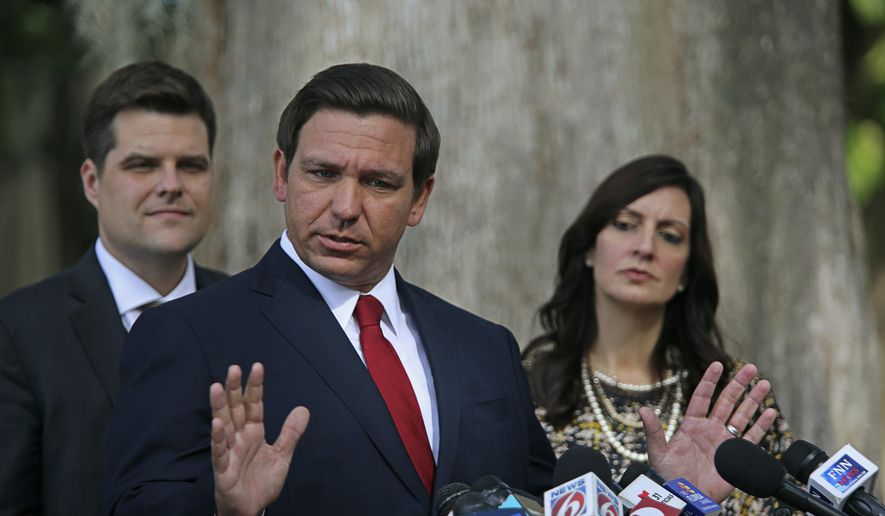With his nomination Tuesday of attorney Carlos Muniz to the Florida Supreme Court, Republican Gov. Ron DeSantis completed a conservative transformation of the bench that could last for years.
Mr. Muniz, 49, has no prior experience on the bench but clerked for two federal judges. A Yale Law School graduate, Mr. Muniz currently serves as general counsel to Education Secretary Betsy DeVos.
His appointment follows that of Barbara Lagoa and Robert Luck, and they replace a trio of departing liberals Barbara Pariente, Peggy Quince and Fred Lewis, all legally required to retire due to their age.
Mr. DeSantis said he picked Mr. Muniz, a longtime member of the Federalist Society, in part because of his commitment to judicial restraint and a narrow ruling of the law.
“For a judge, humility means an unwavering respect for the separation of powers,” Mr. Muniz said Tuesday in Tallahassee. “The role of the judge is to preserve the constitution, not to add to it or subtract from it. I believe strongly in judicial independence, but judges have to earn that independence through their fidelity to the Constitution.”
Conservative groups were overjoyed at the governor’s choices.
John Stemberger, president of the Florida Family Policy Council in Orlando, said the new justices “have completely transformed the court into a judicial body with the potential to have the most reliably consistent and conservative judicial philosophy in the country.”
Democrats, on the other hand, were less enthusiastic about the changes, which they feared could affect schools and abortion rights. Although Mr. DeSantis’ picks had a decidedly Hispanic cast, Democrats slammed them for not including any African-Americans, which means the court will lack a black justice for the first time in decades.
“From his appointment it’s clear that Ron DeSantis has no respect for the rule of law, and is seeking to stack the court with his political allies,” Florida Democratic Chair Terrie Rizzo said in a statement.
The Florida Supreme Court is comprised of seven justices, who are selected by the governor from a list of candidates prepared by a commission.
The fact three new justices would be appointed by the new governor became a point in last year’s gubernatorial race, in which Mr. DeSantis narrowly defeated Democratic nominee Andrew Gillum.
Former Gov. Rick Scott, a Republican, had tried to arrange it so that he would name the replacements before leaving office this month, but that move was blocked by liberal justices who hoped Mr. Gillum would emerge victorious in last November’s election.
Mr. Scott, who won a U.S. Senate seat in the same election Mr. DeSantis won the governorship, did play a role in naming the nominating commission, so he did shape the final picks.
All three of the new justices will face a confirmatory vote in the 2020 general election, and then a statewide merit retention vote at the conclusion of their six-year terms, but no Florida appellate or Supreme Court justice has lost such a vote, meaning the new conservative majority on the Sunshine State’s Supreme Court should last, according to people familiar with Florida’s legal history.
The Florida Supreme Court burst into national prominence for the role it played in the 2000 presidential election recount. At that time liberal justices twice tried to keep Al Gore’s recount effort alive, although their legal reasoning for doing so was rejected by the U.S. Supreme Court on 9-0 and 7-2 votes, respectively.
Mr. Muniz first emerged on the scene as a deputy general counsel to former Republican Gov. Jeb Bush.
Although legal experts at Florida law schools said there do not appear to be any current or pending cases at the Florida Supreme Court that may have national significance, the justices will hear a suit in the matter of Florida’s recently passed law that convicted felons are franchised after the completion of their sentences.
The justices cannot overrule the measure and block the former felons from voting, but they can influence the timeframe involved in the return of the franchise.
The new conservative majority is also likely to uphold myriad education reform measures passed by Republicans in the capital that have expanded the role of charter schools and scholarships in the state, Mr. Stemberger said.
• James Varney can be reached at jvarney@washingtontimes.com.




Please read our comment policy before commenting.